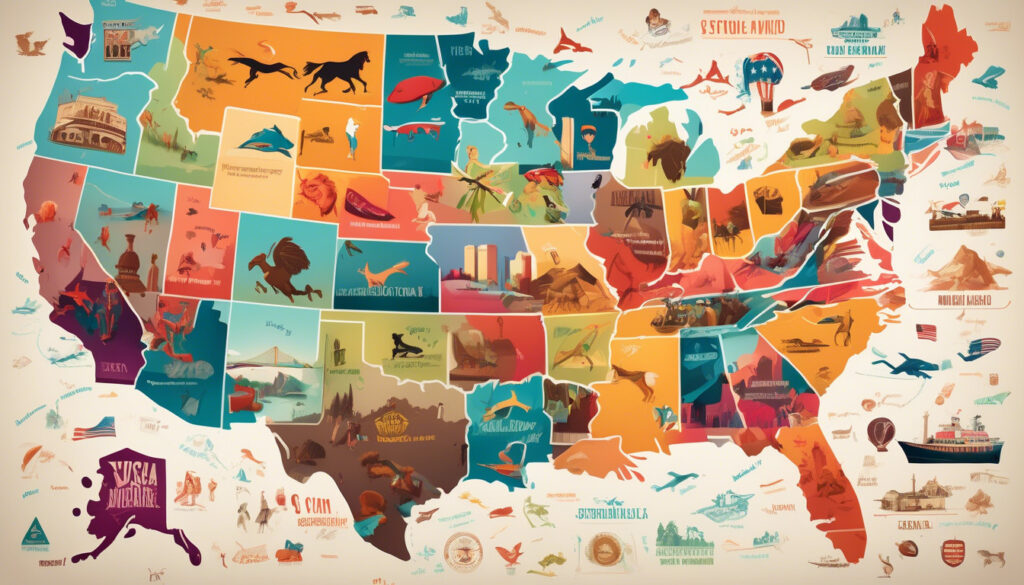As the popularity of sports betting continues to rise across the United States, we find ourselves navigating a patchwork of regulations that vary from state to state. While many of us have embraced the excitement and potential profit that comes with placing a wager on our favorite teams, there are still several states where this form of entertainment remains off-limits.
In this article, we aim to shed light on the states that have yet to legalize sports betting, exploring the reasons behind their decisions and the potential future landscape of gambling legislation. By understanding these nuances, we can gain a clearer picture of how sports betting is evolving in America and what it means for us as fans and potential bettors.
Join us as we delve into the complexities of this topic, exploring the intersection of law, culture, and sports in the ever-changing world of gambling.
Key Areas of Focus:
-
Regulatory Variations:
- Differences in state laws regarding sports betting.
- The impact of these differences on bettors and the betting industry.
-
States with Restrictions:
- Identification of states where sports betting is still illegal.
- Reasons for maintaining these restrictions.
-
Future of Gambling Legislation:
- Predictions on which states might next embrace sports betting.
- Factors influencing legislative changes.
By focusing on these aspects, we hope to provide a comprehensive overview of the current state of sports betting in the United States and its potential future developments.
Current Landscape of Sports Betting Laws
In recent years, we’ve seen a significant shift in sports betting laws across the United States as more states move towards legalization. This change has welcomed a new era where sports enthusiasts and casual bettors alike can enjoy placing wagers legally and safely. Together, we’re witnessing a transformation that’s bringing communities closer and creating a shared experience around sports events.
Legalization has opened doors for tribal gaming as well. Many tribes have embraced sports betting, incorporating it into their existing gaming operations. This move not only boosts local economies but also strengthens cultural ties within tribal communities.
As we navigate this evolving landscape, it’s clear there’s a collective effort to ensure that sports betting is accessible and beneficial for all involved.
With more states considering the benefits of legalization, we’re part of an exciting journey. We’re seeing firsthand how thoughtful legislation can:
- Create opportunities for economic growth.
- Foster community engagement.
- Ensure that everyone feels included in this new chapter of sports betting.
States Prohibiting Sports Betting
While many states have embraced the shift towards legal sports betting, a handful still stand firm in their decision to prohibit it. These states value their current sports betting laws, opting against legalization due to a sense of community and tradition. There’s a strong belief in maintaining long-standing practices and protecting specific interests, such as tribal gaming operations.
The landscape of sports betting in these regions is complex, with diverse reasons for holding off on legalization:
- Moral and Ethical Concerns: Some states prioritize the ethical implications of gambling.
- Economic Considerations: There are concerns about the economic impact on local businesses and communities.
- Tribal Gaming: In certain areas, tribes may prefer to maintain their existing gaming operations separate from state-regulated sports betting.
By respecting these states’ choices, we acknowledge the diversity of opinions that exist across the nation. We may not all agree on the path forward, but we can appreciate the values and priorities that shape each state’s stance on sports betting.
Legal Challenges and Implications
Navigating the Legal Challenges of Sports Betting
Understanding the legal landscape of sports betting involves both federal and state legislation. The federal government provides a basic framework, but each state has the authority to decide its own path to legalization.
This decentralized approach requires vigilance and proactive interpretation of these laws, as they can vary significantly from one state to another.
Role of Tribal Gaming
In states where sports betting is legal, tribal gaming often plays a crucial role. Tribes possess unique sovereignty, allowing them to negotiate directly with state governments. These negotiations can significantly influence regulations, affecting how sports betting is implemented within state boundaries.
- Tribal gaming interests can expedite the legalization process.
- Alternatively, they can complicate the process, depending on the negotiations.
Implications and Community Responsibility
It’s essential for us to consider the implications of these complex legal frameworks. By understanding our shared legal landscape, we can ensure that sports betting is conducted fairly and responsibly.
- This understanding fosters a sense of unity and trust within our community.
- It ensures that all stakeholders are informed and engaged in the legal processes surrounding sports betting.
Impact on Local Economies
The introduction of sports betting can significantly boost local economies by creating jobs and generating tax revenue. When states embrace legalization, we see a ripple effect that benefits us all.
New businesses emerge, such as:
- Sports bars
- Betting kiosks
These businesses provide employment opportunities for our communities. It’s not just about the jobs directly tied to betting, but the broader economic activity that follows.
Sports betting laws, when crafted thoughtfully, ensure a portion of the revenue supports public services, such as:
- Education
- Infrastructure
This reinvestment in our communities strengthens our bonds and enhances our shared spaces.
In states where tribal gaming is prevalent, legalization can be a game-changer. By collaborating with tribal nations, we support their economic growth while respecting their sovereignty.
We all want to belong to thriving communities, and embracing sports betting can be a step toward that goal. It’s about more than just placing bets—it’s about investing in our collective future.
Public Opinion and Political Factors
Public opinion on sports betting varies widely, influencing political decisions and shaping the landscape of legalization efforts across different states.
Supportive Communities:
Many communities rally behind sports betting laws for several reasons:
- Economic benefits
- A sense of modernity
- Connection to a national movement
It’s not just about the revenue; it’s about joining a broader cultural shift.
Opposition:
However, not everyone shares this enthusiasm. Concerns over potential social impacts can sway political leaders who are hesitant to advance legalization.
Complexity in States with Tribal Gaming:
When considering states with significant tribal gaming operations, the conversation becomes even more complex.
Tribal nations often have:
- Their own agreements
- Unique regulations
This adds layers to the debate over sports betting laws.
Political Landscape:
Our political landscape is a tapestry of diverse voices and interests, each contributing to the ongoing dialogue.
The challenge is navigating these intricacies to strive for a balance that:
- Respects tradition
- Embraces new opportunities
This balance is crucial as we move forward in the discussion on sports betting legalization.
Tribal Gaming and Sovereignty Issues
Navigating the intersection of tribal sovereignty and state legislation presents unique challenges in the sports betting debate.
Tribal Gaming’s Role:
Tribal gaming plays a crucial role in this landscape. Tribes operate under their own sovereignty, often negotiating compacts with states to offer gaming activities. These compacts can:
- Create opportunities for tribal communities
- Introduce complexities in sports betting legalization
Balancing Interests:
It’s important to respect tribal sovereignty while addressing the desires of the broader community. Many tribes view sports betting as a means to:
- Enhance economic growth
- Support community programs
However, the negotiation process requires a delicate balance between:
- Respecting tribal rights
- Meeting state regulatory standards
Pathways to Collaboration:
Our goal is to find pathways that honor tribal sovereignty and provide avenues for legalized sports betting that benefit all parties involved. By fostering:
- Collaboration
- Mutual respect
We can navigate these complexities and strengthen our shared commitment to equitable opportunities in gaming.
Potential for Legalization Efforts
Many states are actively exploring ways to legalize sports betting, recognizing its potential to generate significant revenue and enhance public services. There is a growing sense of community among lawmakers and citizens who understand that updated sports betting laws could benefit everyone.
Legalization efforts are gaining momentum, with discussions focusing on how to create a fair system that respects both state interests and tribal gaming rights.
By working together, we can create inclusive sports betting laws that honor existing tribal gaming agreements while opening new revenue streams. It’s about finding a balance that respects the unique cultural and economic contributions of tribal nations while also meeting the needs of our states.
Our collective goal is to ensure that legalization efforts are:
- Transparent
- Inclusive
- Beneficial for all parties involved
By fostering collaboration, we can create a shared vision for the future of sports betting that strengthens our communities and supports vital public services.
Together, we’re paving the way for a more connected and prosperous future.
Comparison with International Regulations
In comparing international sports betting regulations, we can identify several key differences and similarities that highlight diverse approaches to balancing economic benefits and consumer protections.
Countries Embracing Legalization:
- Countries like the UK and Australia have embraced sports betting legalization.
- They have implemented robust systems that prioritize transparency and accountability.
- Their sports betting laws ensure consumer safety while fostering economic growth.
Countries with Stricter Regulations:
- In contrast, some European nations like Switzerland have stricter regulations.
- These regulations emphasize consumer protection over market expansion.
These varied approaches offer valuable insights as we consider our own sports betting landscape.
U.S. Sports Betting Complexity:
- In the U.S., sports betting laws are further complicated by tribal gaming.
- Tribal sovereignty allows for unique agreements and regulations, adding complexity to the national framework.
We find ourselves part of a global community where shared experiences and strategies can guide us. Let’s learn from international examples to shape policies that cater to our economic interests while protecting consumers, ensuring everyone feels included and secure in the evolving world of sports betting.
Conclusion
In conclusion, several states continue to prohibit sports betting, impacting both local economies and public opinion. Legal challenges persist, alongside efforts for legalization.
The landscape of sports betting laws remains complex, with potential for changes in the future.
Stay informed on the evolving regulations to understand the implications for both the industry and society.

